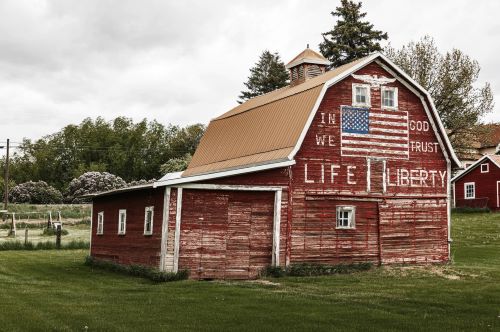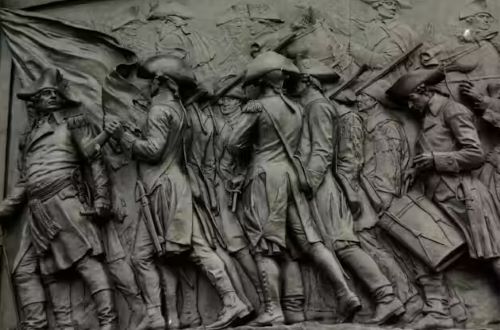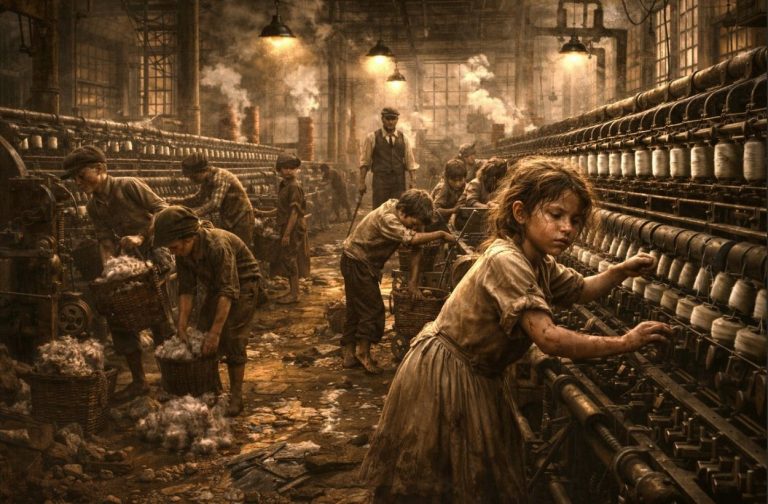

Historical myths are not harmless. They shape how citizens vote, how they treat their neighbors, and what policies they support.

By Matthew A. McIntosh
Public Historian
Brewminate
Introduction
“Make America Great Again” has been one of the most potent political catchphrases in recent American history. Popularized by Trump during his campaigns (and borrowed from Ronald Reagan’s 1980 version, “Let’s Make America Great Again”), it conjures a vision of a better, more prosperous, more unified America—a return to greatness. But greatness for whom, and when exactly was this golden era?
To answer that question, MAGA adherents often invoke an imagined past—a time when “values” were strong, jobs were plentiful, and America commanded unchallenged global respect. Yet, this nostalgia is largely ahistorical. The movement’s core mythos rests on a selective and often distorted understanding of American history—whitewashing injustices, downplaying systemic inequality, and promoting a sanitized version of the past that serves a particular political agenda.
Here I unpack some of the most egregious historical misrepresentations embedded in the MAGA narrative and explores the dangers of building policy and national identity on myths rather than facts.
The Myth of the “Golden Age”
Overview
MAGA rhetoric often gestures toward the 1950s as a golden age of American greatness—a time of booming industry, strong families, and social stability. But this romantic vision omits the brutal realities that millions of Americans faced during that very same era.
Jim Crow and Segregation
The 1950s were a period of racial apartheid in the American South and institutionalized racism across the nation. African Americans faced legal segregation, disenfranchisement, economic oppression, and violence. This era was not “great” for them—it was a time of open racial terror.
Gender Inequality
Women in the 1950s were relegated largely to domestic roles, facing widespread discrimination in the workplace, in education, and under the law. Marital rape was legal. Employment discrimination was rampant. Women could be fired simply for being pregnant.
LGBTQ+ Repression
LGBTQ+ Americans lived in the shadows. Homosexuality was criminalized in many states, and gay and lesbian people were purged from government jobs during the “Lavender Scare.” It was an era of fear and secrecy, not freedom or dignity.
McCarthyism and Political Repression
The early Cold War period was marked by paranoia and political persecution. Americans were blacklisted, fired, or even jailed for suspected Communist sympathies. Civil liberties were regularly violated.
This was not an age of universal prosperity and freedom, but one in which white, straight, male, Christian Americans—especially middle-class and above—benefited from a social order that systematically excluded others.
Founding Fathers as Christian Nationalists
Overview

Another persistent myth in MAGA circles is the idea that America was founded as a “Christian nation” and that today’s secularism is a betrayal of the Founding Fathers’ intentions.
This narrative crumbles under the weight of historical evidence.
Secular Foundations
The U.S. Constitution makes no reference to God and explicitly separates church and state. The First Amendment prohibits the establishment of religion and protects the free exercise of religion—not just Christianity.
Diverse Beliefs
Many Founders were Deists or religious skeptics, including Thomas Jefferson, James Madison, Benjamin Franklin, and even George Washington. Jefferson famously edited his own version of the Bible, removing all miracles and supernatural elements.
Treaty of Tripoli (1797)
This treaty, ratified unanimously by the Senate and signed by President John Adams, states explicitly:
“The Government of the United States of America is not, in any sense, founded on the Christian religion.”
Yet Christian nationalism has become a cornerstone of MAGA ideology, used to justify policies that marginalize non-Christian citizens and roll back reproductive, LGBTQ+, and educational rights.
The Civil War and the “Great Betrayal” of the South
Overview
MAGA-aligned revisionists have also embraced distorted interpretations of the Civil War and Reconstruction. Confederate symbols are defended as “heritage,” and the causes of the war are often misrepresented as about “states’ rights” rather than slavery.
Confederate Documents
The declarations of secession by Southern states explicitly cite the preservation of slavery as their reason for leaving the Union. Mississippi’s declaration, for example, begins:
“Our position is thoroughly identified with the institution of slavery—the greatest material interest of the world.”
The Lost Cause Myth

After the war, Southern elites developed the “Lost Cause” narrative to recast the Confederacy as noble and slavery as benevolent. This myth was propagated in textbooks, films like Gone with the Wind, and public monuments. MAGA circles continue to echo this narrative, which whitewashes slavery and casts white Southerners as victims.
Reconstruction Lies
The era of Reconstruction (1865–1877) is frequently maligned in MAGA discourse as a time of Northern tyranny and Black misrule. In reality, it was one of the few moments in U.S. history when a multiracial democracy seemed possible in the South—before it was violently overthrown through white supremacist terrorism and voter suppression.
Immigration and the False Narrative of “Legality”
Overview
MAGA’s anti-immigration platform is built on the idea that past immigrants “came here legally,” unlike today’s undocumented migrants. This is historically inaccurate.
No Restrictions
Until the late 19th century, there were virtually no immigration laws. Immigrants simply showed up. The idea of “legal” versus “illegal” immigration is a modern invention.
Racist Laws
The first major immigration restrictions—the Chinese Exclusion Act (1882), the Immigration Act of 1924—were explicitly racist, designed to preserve a white, Anglo-Saxon majority. MAGA’s admiration for these laws (as seen in praise for “good old-fashioned” quotas) reflects a desire to return to racially discriminatory policies.
Ellis Island Myth
While many European immigrants were processed at Ellis Island, others were turned away for reasons of race, health, or political beliefs. Moreover, being “legal” was often a matter of luck or changing laws, not personal virtue.
Misusing the Founding to Justify Guns and Insurrection
Overview
The Second Amendment is sacred in MAGA circles, often interpreted to mean that citizens should have unlimited access to firearms to “resist tyranny.” This interpretation distorts both historical context and legal precedent.
Militia Context
The Second Amendment was written in the context of state militias—not private arsenals. It was shaped by fears of standing armies and the need for collective defense in an age before a national army.
Insurrectionist Myth
The idea that the Founders wanted citizens to rise up against their own democratic government is belied by their brutal suppression of actual uprisings, like the Whiskey Rebellion (1794). The Constitution was designed to create a strong federal government—not to encourage constant armed rebellion.
The January 6th Capitol attack, in which MAGA supporters attempted to overturn a democratic election through violence, was the logical culmination of this dangerous misreading of history.
The New “Patriotic Education” Agenda
In reaction to the 1619 Project and other efforts to center slavery and systemic racism in American history, MAGA politicians have pushed for “patriotic education”—a euphemism for historical erasure.
Trump’s short-lived 1776 Commission claimed that systemic racism was not a serious problem and attacked progressive historians as “anti-American.” The report was widely panned by scholars for its inaccuracies, lack of citations, and ideological bias.
This push for sanitized history is not new. It mirrors efforts in the Jim Crow South to erase Black history, glorify the Confederacy, and control what children learn about their country’s past. Today’s book bans, attacks on “Critical Race Theory,” and censorship of LGBTQ+ history are part of the same authoritarian impulse.
Conclusion: Why It Matters
Historical myths are not harmless. They shape how citizens vote, how they treat their neighbors, and what policies they support. When political movements like MAGA distort the past, they do so not for the sake of truth, but to legitimize power and suppress dissent.
A nation built on historical falsehoods cannot reckon with its present or build a just future. Patriotism, if it is to mean anything of value, must be rooted in honesty—not nostalgia. It must acknowledge both the triumphs and the tragedies of the American story.
History is not a comfort blanket; it is a mirror. And right now, MAGA refuses to look into it.
Originally published by Brewminate, 06.18.2025, under the terms of a Creative Commons Attribution-NonCommercial-NoDerivatives 4.0 International license.


